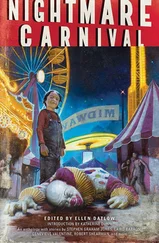But there were times over the years when Arty’s tank developed an odd, slimy moss that seemed immune to the chlorine. It would start in a tiny patch on the glass behind one of the pumps and spread. It also spread to Arty. I was the one who helped him with his shower after each show. I always soaped him and sponged him but he hated being tickled and he was particularly ticklish directly behind his balls, so that was a spot we often missed. When the galloping green caught on in the tank it caught Arty by the balls and in the shady space behind them. I had to use a scrub brush to get the stuff off him.
I hated to ask Chick for help. It infuriated Arty and made it seem that I wasn’t worth anything at all since Chick could do everything better than anybody. But on this night Arty was roaring in the tub-shower and thrashing around threatening to bite me as I tried to scrub his privates. I was about ready to drop the brush and holler when Chick opened the door and stuck his head in. “Oly …” he started, but I jumped up and grabbed his hand and pulled him into the bathroom.
“Take the mildew out of Arty’s crotch!” I snapped.
“There’s a man outside that I don’t like,” said Chick.
Arty wallowed irritably in the hot spray from the shower and rumbled at us. “Do this shit-squirting job and then worry about that!”
“It’s on the back side of the balls, in the wrinkles, and behind his balls almost all the way to his asshole,” I said.
Chick looked at Arty. A thin trail of green smoke — almost invisible — rose from the tub and hovered above the floor.
“What should I do with it?” asked Chick.
“The toilet,” I said.
“No,” growled Arty. “It might stay in the works and creep up my ass again.”
“Well …” said Chick. The smoke condensed into a distinct pea-sized puff and wobbled in the air.
I chuckled. “Put it in Dr. Phyllis’s underwear drawer.”
Chick looked at me. “Now, Oly …”
“Take it with you! Get rid of it! Throw it into the middle of the Pacific! I don’t care!” Arty flicked the shower tap off with his flipper and lurched up, catching the rim of the tub with his chin. I hoisted him out and started to towel him dry.
Chick leaned back against the door and crossed his arms to look at us seriously. “The man outside wants to see you, Arty, but I don’t think you should.”
Arty rotated his shoulders under the towel. He grunted.
“He writes notes,” said Chick. “He can’t talk and he’s lost his face.”
“Yah, yah,” sneered Arty.
“He stayed through both your shows and then went to talk to Horst. Horst says he asked about the twins and Oly and Mama and that he claims to have met you before.”
Arty looked to see that I had the bottle of oil and then punched the door open and rolled into his room with the towel wrapped around him. He was climbing onto his massage bench when he said, “Tell the guy to wait. Bring him in fifteen minutes and then get yourself into the security room and keep an eye on him. How big is he?”
“Big,” said Chick. “But slow.”
“Oly will stay with me,” said Arty, and he stretched and wriggled his flippers and waited for me to start oiling him.
Chick’s face crumpled in sour worry from the chin up but he turned and went out with the compressed pill of mold floating behind him like a pup.
• • •
Arty was sitting in his big chair, dressed in dark wine velvet and sipping at the straw in his tonic water when Chick brought the man in. He was as tall as Al and very lean. He stopped just inside the door, his one eye fixed on Arty, and dipped his knees in what must have been a bow. His face was covered by a grey cloth that fell from inside his baseball cap and drooped into his open shirt collar. Only his right eye peered out at us.
“Mr. Bogner,” said Arty.
I pushed up a chair for the big man and he moved toward it and folded into it slowly and with great care. I remembered a story about a miser who had a deep dent in the top of his head. The rain had filled it with water and there were goldfish in it. The miser moved very carefully and slept sitting up so as not to spill his private fish preserve.
The masked man balanced a pad of paper on his knee and looked at Arty. I stood close, fiddling with a spray can of Paralyzer. The lamp on the bureau went on and I took half a step back so Chick would have a clear view of the big guy through the mirror.
I flinched when he lurched forward and began scribbling on the pad. He ripped the sheet off and held it out to Arty. I took it and held it for Arty to read. The script was a fast block print, very legible. It said, “I’m glad to see you again. I shot at you in a parking lot ten years ago.” He was leaning forward, his one eye sweeping its gleam over us both eagerly. His baseball cap was dark blue and the bill was pulled down. The top of his veil was tucked under the left side of the cap so he looked like a game of peekaboo. The veil bulged at his neckline in a bag that seemed to swell and fall back with his noisy breathing. He was literally a Bag Man.
Arty was still and staring, no expression on his smooth, wide face, only his eyes weren’t blinking and were wider open than usual. He was holding his breath. I couldn’t read the Bag Man’s eye. It moved and light came off it, but there was no flesh to crinkle around it and tell me what the eye meant. I got a grip on the Paralyzer and dug my heels into the carpet.
Arty let his breath out. Then he took some in. In a half-joking and familiar tone he said, “Now, why ever did you do that?”
The Bag Man blinked and bent over his knee, writing fast with his pen scratching and jumping in his big weathered knuckles. He ripped the sheet off and handed it to me and then kept on writing. The paper said, “Things were slipping on me — oranges at first — then everything. My wife and kids had no respect for me. I started going up to the woods with my old man’s 30.06 on weekends but I never did any hunting. Just sat by the fire and cleaned the rifle and had a few beers.”
• • •
He didn’t remember much of the trial, though he was quite clear on being booked. The photographer and the fingerprinting struck him as dull. He felt that he should struggle or shout, cry, anything to make the proceedings important. But he was too tired, and looking into the faces of the uniformed men going about their work made him anxious not to disturb or trouble them. “Who knows what their wives are like?” he thought. Sitting in the cell alone, he decided that he had done something that couldn’t be put right. He lay quietly on his bunk and tried to think. On the second day a man came who claimed to be Emily’s lawyer. Emily was filing divorce papers.
The trial was vague and boring. He remembered an old woman, very neatly dressed and sharp-voiced. She was sitting on the chair next to the judge’s bench and she said, “… If you ask me I’d say it was a charitable instinct for mercy. I felt the same way. I’m not one who’d say it was a wrong thing to do.”
Vern was confused about the charges. They tried to convince him that what he had done was wrong and after a while he pretended to believe them. But he knew that he was being punished for his failure. After all, they had been lined up. Absolutely in line, and he — the story of his life — had missed.
He liked the State Hospital. He didn’t mind the steel mesh on the windows. He had a room of his own and three sets of green pajamas. He swept his floor every morning, ate the food on the tray, and had a nap on his neatly made bed. When he woke up the tray and the broom were gone and his room was bare and tidy again. He slept a lot and managed to forget nearly everything.
After a year or so he started thinking again, though he didn’t much want to. What he thought about was children. Teddy and Brenda had been six years old and five when he last saw them. First he remembered their voices saying “Dad.” He dreamed that his only real name was Dad and the other things that people called him were either aliases or insults. He remembered seeing a whistle on the shelf of a variety store and wondering if Teddy would like it, wondering if he should get one for Brenda too.
Читать дальше












